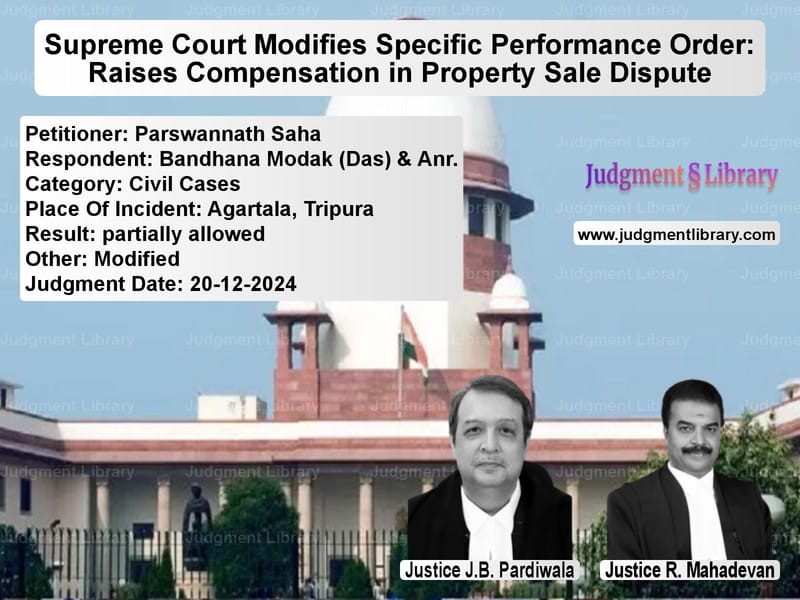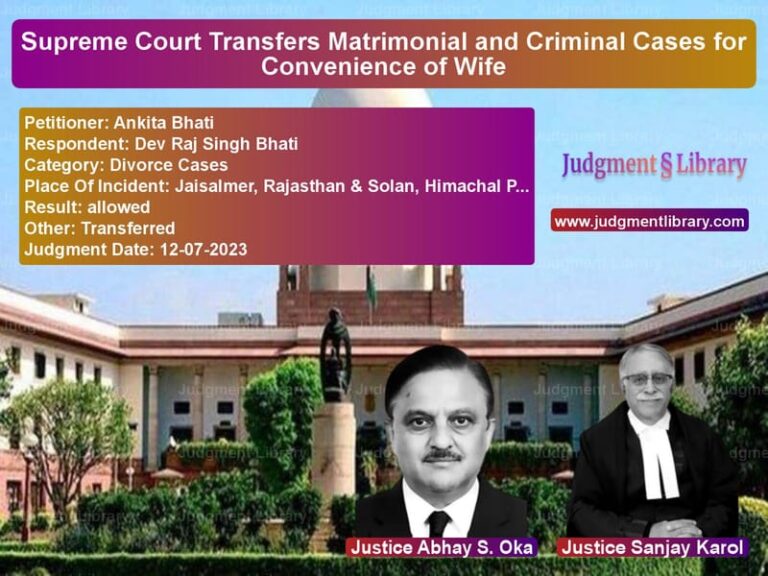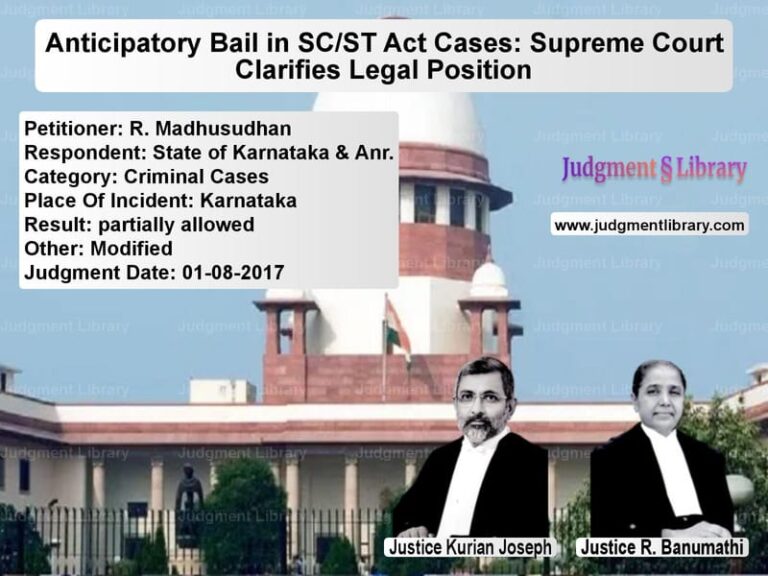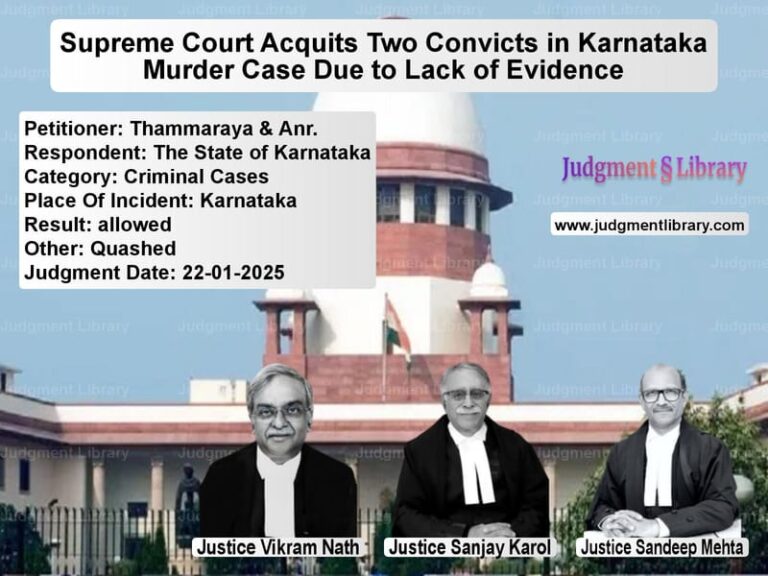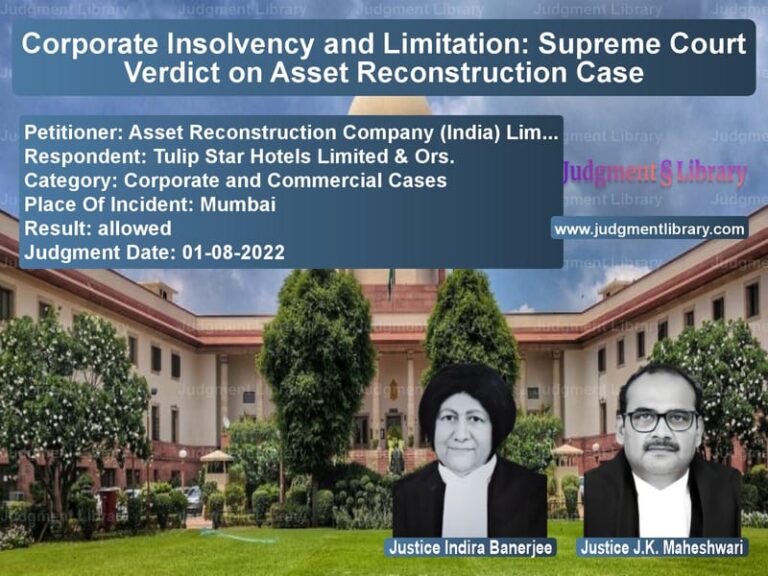Supreme Court Modifies Specific Performance Order: Raises Compensation in Property Sale Dispute
The Supreme Court of India has modified a lower court order in the case of Parswannath Saha vs. Bandhana Modak (Das) & Anr., ruling that while specific performance of a sale agreement must be upheld, additional compensation should be provided to the seller to account for hardship. This judgment balances contractual obligations with equitable relief in real estate transactions.
Background of the Case
The dispute arose from an Agreement for Sale dated May 27, 2016, wherein the appellant, Parswannath Saha, entered into a registered agreement with Prabha Ranjan Das, the deceased husband of the first respondent, for purchasing a property.
The key facts were as follows:
- Total Sale Consideration: ₹17,50,000
- Earnest Money Paid: ₹4,00,000
- Seller’s Death: Prabha Ranjan Das passed away on July 5, 2016, leaving behind his wife (Respondent No. 1) and minor son (Respondent No. 2).
- Seller’s Family Declined to Execute Sale Deed: The respondents refused to execute the final sale deed, claiming hardship and lack of alternative housing.
Trial Court’s Ruling
The Trial Court ruled in favor of the appellant, ordering specific performance of the agreement, holding that:
- The agreement was legally valid and enforceable.
- The respondents failed to prove that selling the property would cause undue hardship.
- The appellant had always been ready and willing to perform his part of the contract.
- The respondents were directed to execute the sale deed and hand over possession upon receiving the balance amount of ₹13,50,000.
High Court’s Reversal
The respondents appealed to the Tripura High Court, which set aside the Trial Court’s order, ruling that:
- The respondents (wife and minor son) would face extreme hardship if required to sell the property, as they had no other place to live.
- Specific performance should not be granted merely because it was legally valid; courts must consider equitable factors.
- The appellant was entitled only to a refund of ₹4,00,000 with 8% interest, rather than ownership of the property.
Supreme Court’s Examination
The Supreme Court, led by Justices J.B. Pardiwala and R. Mahadevan, reviewed whether the High Court was justified in refusing specific performance.
1. When Can Specific Performance Be Refused?
The Court referred to Section 20 of the Specific Relief Act, 1963, which allows courts to refuse specific performance if enforcing the contract would cause unforeseen hardship.
“The court is not bound to grant specific performance merely because it is lawful to do so. The discretion must be guided by judicial principles.”
2. Did Hardship Exist in This Case?
The Supreme Court found that while the respondents claimed they had no alternative residence, they were not residing in the disputed property at the time of litigation.
“There is no evidence to suggest that the defendants were residing in the suit property. The claim of hardship appears to be an afterthought.”
3. Can Compensation Be an Alternative?
The Court ruled that while specific performance was appropriate, an increased payment to the respondents would balance their hardship.
“Instead of outright refusal, the hardship can be mitigated by directing the appellant to pay a higher consideration.”
Final Judgment
The Supreme Court ruled:
- The High Court’s judgment was set aside.
- The Trial Court’s order for specific performance was upheld, with modification.
- The sale deed must be executed within 45 days.
- The balance amount payable by the appellant was increased from ₹13,50,000 to ₹20,00,000.
- Possession must be handed over immediately after execution of the sale deed.
Implications of the Judgment
This ruling has significant implications for real estate contract enforcement:
1. Courts Must Balance Equity and Law
Specific performance is not automatic; courts must consider hardship and compensate fairly.
2. Hardship Must Be Proven with Evidence
Parties cannot merely claim hardship; they must prove it with factual evidence.
3. Compensation Can Be a Middle Path
Instead of denying specific performance, courts can modify orders to account for changed circumstances.
Conclusion
The Supreme Court’s ruling in Parswannath Saha vs. Bandhana Modak (Das) & Anr. strikes a balance between contract enforcement and fairness. By modifying the compensation, the Court ensures that both parties are treated equitably while upholding the sanctity of contractual obligations.
Petitioner Name: Parswannath Saha.Respondent Name: Bandhana Modak (Das) & Anr..Judgment By: Justice J.B. Pardiwala, Justice R. Mahadevan.Place Of Incident: Agartala, Tripura.Judgment Date: 20-12-2024.
Don’t miss out on the full details! Download the complete judgment in PDF format below and gain valuable insights instantly!
Download Judgment: parswannath-saha-vs-bandhana-modak-(das)-supreme-court-of-india-judgment-dated-20-12-2024.pdf
Directly Download Judgment: Directly download this Judgment
See all petitions in Property Disputes
See all petitions in Specific Performance
See all petitions in Damages and Compensation
See all petitions in Judgment by J.B. Pardiwala
See all petitions in Judgment by R. Mahadevan
See all petitions in partially allowed
See all petitions in Modified
See all petitions in supreme court of India judgments December 2024
See all petitions in 2024 judgments
See all posts in Civil Cases Category
See all allowed petitions in Civil Cases Category
See all Dismissed petitions in Civil Cases Category
See all partially allowed petitions in Civil Cases Category

